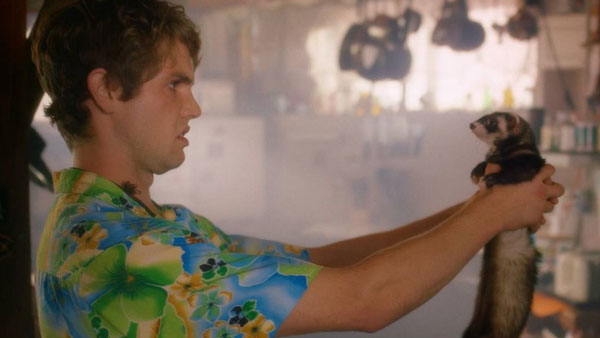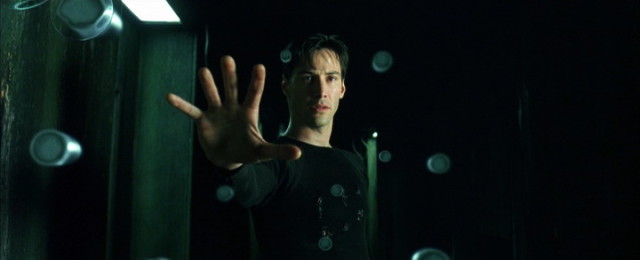Okay, I’ve got good news and I’ve got bad news. The good news is, I’m finishing reading the Scriptshadow 250 contest scripts this week. The bad news is, that means I won’t have time to post the rest of the week. But this leads us to some better news. Next Wednesday, I’ll be posting a list of the TOP 25. And from there, things will move rather quickly, as I post the top 5 soon after, and finally the winner, who will get an option from Grey Matter. So buckle up everybody. The day you thought would never happen is finally within reach. I’ve found some amazing writers so I’m really pumped to finally share them with the world!
Genre: Superhero
Premise: Pretty sure the title gives it away.
About: Batman vs. Superman came out this weekend, and while the critics didn’t like it, it pulled in 170 million dollars. That doesn’t beat out some recent big earners (like Star Wars), but it’s a very strong opening for a superhero film. The film has been in development for 20 years. It took Marvel’s success with The Avengers to finally push WB over the edge to commit to the film.
Writers: Chris Terrio and David S. Goyer (Batman created by Bob Kane and Bill Finger) (Superman created by Jerry Siegel and Joe Shuster)
Details: 2 hours and 30 minutes long
One of the commonalities I’ve noticed in the reviews of this film is how dazed the reviewers are. You know in war movies how the soldiers are on the battlefield and a bomb blows up near one and we hear that ringing noise and the soldier kinda looks around, bullets whizzing by his head, wondering what the hell just happened? That’s how I imagined most reviewers looking after they left their showing of Batman vs. Superman.
Count me amongst that group.
The best way I can describe this movie is – imagine Warner Brothers receiving five separate screenplays, one each for Batman, Superman, Lex Luthor, Wonder Woman, and Lois Lane, and then a studio head came in and said, “What if we mixed all these together?” And another studio head said, “Yeah, and what if we started shooting it in a month?”
And so some poor writer was tasked with cramming all these individual stories into a single nonsensical monstrosity that was unleashed upon an unsuspecting public who just wanted to see a cool superhero film.
I don’t even know if I should try and summarize the plot, since only a teensy bit of it makes sense, but to the best of my abilities, here’s what I think goes down. Batman is angry that Superman accidentally killed all those people in his city battle with Zod in the previous movie. So he becomes obsessed with killing Superman.
Superman, on the other hand, thinks BATMAN is the irresponsible killer. This is based on how Batman ‘brands’ the villains he catches, which is supposed to be a ‘death sentence’ to those villains once they go to prison.
Meanwhile, Lex Luthor doesn’t like Superman either, and finds some kryptonite in one of the ships Zod brought to earth. When Batman learns about this kryptonite batch, he wants a few scoops, cause that way he’ll have a fighting chance in his cage match against Superman.
The big battle finally happens (spoiler), but as you already know after watching many of these So-and-So vs. So-and-So movies, nobody technically wins. The two end up becoming BFFs just in time to face another threat – that being some crazy-ass villain named “Doomsday” who Lex Luthor created. Enter other superheroes like Wonder Woman who decide to help, and the real battle in Batman vs. Superman begins.
Three years ago, when this movie was announced, I wrote an article titled, “Is Batman vs. Superman The Single Hardest Screenplay to Write In History?” – Not to toot my own horn, but after re-reading that article, it’s scary just how accurate it was. Everything I predicted happened.
The main thing I knew would be trouble was how are you going to believably set up that Batman and Superman would want to fight. Of the two motivations, Batman’s is more convincing – that Superman killed all those people. But come on. There was that sort of important extenuating circumstance. As in the alien who could’ve killed everyone on earth if Superman didn’t stop him? Hasn’t Batman ever heard of collateral damage?
But Superman’s motivation – that was a head-scratcher. Batman was branding the bad guys he captured which meant they’d be killed in prison? First of all, they’re bad guys, so who cares. Second, it didn’t even make sense. If you were a bad guy with a Batman brand on your shoulder, I’d think that’d make you more of a prison celebrity than a target.
At first glance, this might not seem like a big deal. Who cares why they’re fighting? As long as they fight! But see, you’re wrong. Whether it’s the seasoned Hollywood reader or the twice-a-year moviegoer – when you overtly manufacture plot points in a story, the audience knows something is off. They feel the manipulation on a subconscious level. Which is the opposite of what movies are supposed to do. The best movies make you forget that you’re watching a movie. Anything you do to break that suspension of disbelief is a film-killer.
What confuses me is that they spent an entire extra year on “getting this film right.” That was a HUGE risk by Warner Brothers. To forego all that money in order to work on the script and make this the best movie it could be. Now that I’ve seen the film, I’m struggling to figure out where all that extra time was used? Was it so Snyder could bump the number of slow-motion shots in his film up from 30 to 60?
There were just a lot of sloppy or weird things about this film. I’ll give you three examples.
There’s a scene where Batman learns that Lex Luthor is shipping kryptonite from one location to another location. So he says, I’m going to get that shipment, and one scene later, he’s in his Batcar chasing after the shipment. It’s supposed to be one of the featured action set-pieces in the film, yet something about it feels empty, almost like by the time we catch up with what’s going on and actually care, it’s over.
There’s a reason for this. The setup was too fast. We only JUST HEARD about this shipment a scene ago, and therefore weren’t prepared when Batman decided to go after it the very next scene. The thing with action set pieces (and really any scene) is that they work best when they’re set up properly.
A proper setup and payoff requires two things: Time and frequency. Let’s say that Batman had heard about this shipment five scenes ago. Now we have five entire scenes to build up the importance of that shipment, to create anticipation in the audience. In addition to that, you want to FREQUENTLY mention the problem. If the filmmakers show Batman trying to figure out the logistical problems involved in obtaining this kryptonite, the audience is subliminally being reminded of the importance of this plan. NOW when the scene arrives, it’ll actually carry some weight.
To understand this better, look at the movie Taken. I know, I know, a lot of people hate Taken. But I want you to imagine, for a second, that Liam Neeson’s daughter is taken in one scene and then in the very next scene Liam Neesons bursts into the bad guy’s hideout and gets her back. How satisfying would that scene be? Not very, right? Because there was very little time between the setup and the payoff, and absolutely no frequency. So if you’re ever struggling with a big set-piece, the problem may be that you didn’t set it up properly.
We’ll now move from the technical to the bizarre. In the middle of Batman vs. Superman, Batman goes to some desert hideout where, for whatever reason, the bug-flying aliens from Star Wars: Attack of the Clones make an appearance. Who were these bug-flying peeps? Why were there all of a sudden bug-people in Batman vs. Superman? No idea! But I think this was some sort of dream sequence.
And therein lies a bigger problem. Every screenwriter worth their salt knows that you don’t write dream sequences. Dream sequences are meant to be left in film school. Outside of comedies, they are an indicator of the amateurs of the amateurs. You simply don’t use them. But the TRUE amateur move is to place major plot points inside of your dream sequences (“Lois Lane is the key” here in Batman vs. Superman). It’s lazy, it’s sloppy, and just plain lame.
Remember The Matrix 2? The whole thing was driven by this lame dream sequence plot point that Trinity was going to die. Same thing with Revenge of the Sith. Anakin’s motivations were driven by some lame dream sequence where he imagined that Padme was going to die. Are either of those films known for their deftly executed screenplays? No. And it’s because if you’re making a mistake that blatant, you’re usually making a lot more mistakes along with it.
This doesn’t even get into the fact that there’s no reason you should need a dream sequence in a superhero film!!! Dream sequences are there to add funky supernatural weird shit that you wouldn’t otherwise be able to fit into your main plot. But with a superhero movie, you have fucking superheroes!!! You already have the weird, the strange, the macabre. Why would you need to create a dream sequence? The whole movie is a dream sequence.
Finally, I want to bring up the scene that should’ve been one of the best scenes in the movie, but fell short for the very reason the entire movie fell short – because they overcomplicated it. The scene occurs when Batman and Superman meet each other as their alter egos (Clark Kent and Bruce Wayne) at a public gathering.
What we have on display here is one of the most powerful devices in screenwriting – dramatic irony. To refresh everyone’s memory, dramatic irony is when we know something the character does not, usually that they are in danger. So if Jill is heading into her house and we already know that the killer is inside waiting, that’s dramatic irony.
The thing with the Clark-Bruce meeting though is that instead of only knowing what one character doesn’t, we know what two characters don’t. We know that Clark Kent is actually talking to Batman and that Bruce Wayne is actually talking to Superman. This “double” version of dramatic irony makes things a little more complicated and it’s up to the audience to decide if they like this better than your traditional one-sided dramatically ironic situation.
But where things really get weird is that both characters approach the conversation like they DO KNOW who the other secretly is. You see this in their accusatory subtextual verbal sparring. This begs the question: Do these guys know who the other is? Am I missing something? Or is this just the actors misplaying the scene? The point being: even in the simplest slam dunk scenes in the movie, the writers and director found a way to make it more complicated than it should’ve been.
I could honestly talk about this movie all day. I don’t even think it was a bad movie so much as it was a sloppy one. And Chris Terrio is a great writer. He’s got a script up in my Top 25 right now. It’s a reminder that screenwriters on these mega-pics are thrown into a meat-grinder. Whether what comes out is a soggy Big Mac that’s been sitting under a heat-lamp for three hours or a fresh-off-the-grill Double Double from In-and-Out, is often out of their control. So it sucks when we, indeed, get that Big Mac. Maybe once they split these DC movies off into singular adventures, the writing will get better, and we’ll start getting meals worthy of our appetite.
[ ] What the hell did I just watch?
[x] wasn’t for me
[ ] worth the price of admission
[ ] impressive
[ ] genius
What I learned: When a subplot isn’t working, DROP IT. When a character isn’t working, DROP THEM. There’s no faster way to decimate a script’s pace than to keep a subplot that isn’t working. Every time you cut to that subplot, you are essentially putting your movie on pause. Excising Lois Lane’s pointless investigation into a bullet that framed Superman could’ve shaved 20 minutes off this film. Oftentimes, writers believe that just because they’ve spent a lot of time on a character/subplot that they have to keep it/them in. No no no. A thousand times no. If it’s not working, chop it out. I guarantee that you won’t even remember that it was there in a month.
Batman vs. Superman. Pft. How bout Time Shark vs. Dude, Where’s My Ferret?? Now that’s a real showdown! Not that it’ll ever happen but still.
Before we get started, I thought I’d bring you into my world for a moment. I’m honestly trying to do good here. But I still get 1 to 2 e-mails a week that read like this gem I received yesterday: “Carson, I’ve been reading you for years and I’ve sent you several high quality screenplays to read, but I get no response. You pick out the worst dreck you can find and review it. Now I’m done with you.”
Don’t you realize e-mails like this make me feel like Sad Affleck?
Look, we all believe our ideas are better than everyone else’s. Or else why would we write them? But if you’re not getting a good response from sending your logline in (to me and others), there’s probably something wrong with it. The bar some weeks is really low. Sometimes it comes down to, “Can the writer form a cohesive sentence with his logline?” I’m not hiding away a series of brilliant scripts here. If you’ve got something that even sounds capable, it’s probably going to make the site.
If you’re really struggling with why your pitch isn’t getting traction, post your idea in the comments and let others tell you if you have the greatest logline since Jurassic Park. Or get a friend’s opinion. Make sure to INSIST they be honest with you (or they won’t). But seriously, take some responsibility for your stuff instead of passing it onto others. I guarantee you that your writing will improve.
Okay guys, you know the drill. Read the scripts below (or read as far into the script as you can), then vote for your favorite in the comments section (“I vote for BLAH BLAH”). But if you want to be a really helpful dude or dudette, give feedback to the writers. It’s particularly helpful for writers to know where you stopped reading and why. Oh, and if you’d like to enter your own script for a potential Amateur Saturday slot, send me your title, genre, logline, why we should read, to Carsonreeves3@gmail.com. We need some fresh submissions so get those scripts in!
Title: FOUND FOOTAGE
Genre: Animation/found footage
Logline: “A group of trainee scout ants who find themselves battling to stay alive after a training exercise in a suburban home goes horribly wrong…this is the found footage”
Why You Should Read: Haunted by all the ants that I’ve killed, I found myself with no choice but having to write this script. I hope it does justice to all the ants that have fallen in battle, most specifically the ants from the Eighth Antiment: For Queen and Colony. Hoo-hah!
Title: Vultures ‘N’ Doves
Genre: Action/Heist
Logline: An estranged group of musicians, of a once successful band, reunite in order to pull a series of robberies at major concert venues, all in one night, in an attempt to take back the millions they feel were stolen from them by their ex-manager, who now runs the venues they target. Their greatest hits, are robberies.
Why You Should Read: I love heist films. Primarily, grounded heist films. Shit that could happen. Shit that, if we put our minds to it, and had just the right opportunity, for just the right reason, we might be able to pull off and would risk doing so. Any heist situation is absolutely nuts to attempt, so it has to be about more than the money. There has to be something so wrong with the system, the person, the past or the present where it seems there is no other choice. Vultures N Doves is unique twist on the heist film, something I’ve never seen in a movie before, it’s amped up fun, there’s a couple of outrageous set pieces, and most importantly, a main character with a rockstar ego, who is struggling to keep his band, marriage, and life together.
Title: Scary Monsters
Genre: Horror/Comedy
Logline: When citizens of a small town begin transforming into werewolves, vampires, ghouls and goblins, the only person who seems to notice is the town’s narcissistic black sheep.
Why You Should Read: The Universal monsters will be creeping their way back into theaters over the next few years. “Scary Monsters” is the comedic answer to this. The script is an R-rated monster mash that I’ve been working on for about three years. It’s heavy on humor, while still maintaining its heart. I feel like the story veers in some interesting and offbeat directions as it goes on, especially in the final act. My style of humor is on full display here, as is three years’ worth of depression, addiction and self-loathing. Fun. If you do read the script, I hope you enjoy it and I would love some feedback.
Title: John Brown’s Body
Genre: Historical Fiction (Based on True Events)
Logline: After a lifetime of failure, John Brown attacks the United States Armory at Harper’s Ferry in one last ditch effort to free the slaves.
Why You Should Read: In earlier forms, this script placed in the top ten in Final Draft’s Big Break, was a semifinalist in Page and received a “Consider” from Coverage Ink. I’ve worked hard on the notes I’ve received and I think I’ve made it better. I understand that it’s a period piece (but isn’t Catherine the Great?), however it’s a really cool moment in history that has been ignored on the big screen. I like to think of this story as the American version of Braveheart.
Title: Sinkhole
Genre: Comedy
Logline: A self-centered, good ol’ boy chooses getting a pool over fixing the house, resulting in him falling through a sinkhole into another dimension where things are deceivingly better.
Why You Should Read: Brandi didn’t leave a “Why You Should Read,” so this is Carson explaining why I picked this. I’m obsessed with sinkholes. I’m not kidding. I think they’re fascinating. So there was no way this wasn’t getting onto the site. (p.s. If you have any sinkhole pitches or scripts, send them to me!)
Genre: Comedy (Stoner)
Premise: After accidentally losing her company’s mascot, an uptight junior food scientist reluctantly enlists the help of her pothead building superintendent and together they battle against a relentless vermin exterminator to recover the missing ferret before her career goes up in smoke.
Why You Should Read: With marijuana being legalized all over the place, it’s a topical subject, plus it has a fresh twist with the ferret angle. Stoners and ferrets go together like macaroni and cheese! I’ve directed several short films featuring ferrets, including a short called DUDE, WHERE’S MY FERRET? that is meant as a teaser for the feature version, featuring Bubbles from The Trailer Park Boys. I also directed THE MAGIC FERRET, which was Jacob Tremblay’s (Room) first leading role. I like working with ferrets because it’s something different than what most people are used to seeing – and I know something about them because I have one as a pet (used to have two, R.I.P. Falcor the Ferret). I think this is a great recipe for a stoner comedy – but we need some help to get it to where it needs to be. I say ‘we’ because I’m the director but not the writer – I found someone to write this for me while I learn the craft. We could highly benefit from a review by Carson and our peers. I’m smishsmosh22 and promise to participate in the comments if we get chosen!
Writer: Tim McS
Details: 93 pages
Dude, where’s my ferret?
It’s fun to say, right? Go ahead, try and say it without smiling.
Like a talking ferret, it’s impossible.
Unless, of course, you believe in talking ferrets. And in that case, you’ll like this script. In fact, one of the first things you’ll realize when reading today’s script is that Tim McS really likes ferrets. No, I mean like really really really likes ferrets. And while we’ve always supported the mantra, “Write what you know,” at what point has that philosophy gone too far???
26 year old Laura Frye is a junior food scientist. That means she designs food to taste better, last longer, or look more interesting. And her latest project is improving the lifespan of a pet food company’s ferret food line. As you might imagine, the CEO of the company, Peterson, is none too pleased with this development. The faster ferret food goes bad, the sooner the customer has to buy more ferret food. So Laura’s invention will lose the company money.
After dropping a couple dozen F-bombs on her, Peterson punishes Laura by assigning her to watch the company ferret (lovingly named “Ferret Bueller”) for the evening and bring him to his big ad photoshoot tomorrow. Ironically, Laura doesn’t even like ferrets. But she waltzes back to her apartment with the ferret and somehow ends up in 25 year-old All-Star stoners, Spoke and Noodle’s apartment.
After accidentally eating their pot cookies, Laura inadvertently lets Ferret Bueller loose. With her job on the line, Laura desperately enlists the help of Spoke and Noodle to find Ferret Bueller, who has since crawled into the walls and is running around the insides of the apartment complex.
Laura and Spoke team up, following the screams from apartment to apartment, while Noodle heads down to the basement, which he seems to think is the best place to find stray animals.
I should mention that Noodle lost his memory in a terrible accident years ago and has no idea who he is. So, of course, he starts seeing hallucinations of Ferret Bueller, who begins talking to him, revealing pieces of his past, from which he finally starts putting together his identity.
Meanwhile, unlikely sparks are flying between Spoke and Laura. She’s educated, driven, and organized. He’s jobless, dumb, and addicted to pot. But if you’re both high, none of that matters. And you can never predict how the search for an elongated rat-animal-thing can bring two people closer. But will they capture that little minx before it’s too late? Dude, read the script to find out!
Hey, I got a joke for you. How did one ferret receive money from another ferret? He inferrited it.
Haha. You get it?
Right.
Anyway, Dude Where’s My Ferret is a surprisingly well-constructed screenplay considering the subject matter. Typically when I read these kinds of wacky comedies, there is zero effort or even understanding of how to add structure to the story. The scripts are usually a series of loosely-connected sketches.
We’ve got some great GSU here (goal, stakes, urgency). Goal – find the ferret. Stakes – Laura’s job. Urgency – the photo shoot. So we’re always clear on what needs to happen and where we are in the story. That’s important. A lot of writers don’t know how to do that, causing their scripts to wander.
It’s a clever little plot too. The fact that we get to chase the ferret through the building allows us to go into the apartments of a varied cast of characters. It was basically a license to go crazy with character, and as anyone who writes comedy knows, crazy/weird/outrageous characters are key. Melissa McCarthy’s character in Bridesmaid’s. Mr. Chow in The Hangover.
I also liked the technologically sophisticated pest exterminator. An exterminator who uses drones to search for his prey – I’d never seen that before. But more importantly, McS was employing a classic storytelling technique. Figure out what your main character wants, then put as many obstacles in front of that “want” as you can. The more creative the obstacle, the better.
So with all this good, why didn’t I love Dude, Where’s My Ferret? Well, to put it plainly, I thought the comedy was too standard. One of my big red flags when it comes to comedy is excessive swearing. It’s not that swearing can’t be funny. With the right character, it can be hilarious. But usually it’s a sign of the writer not being creative enough. A guy who swears a lot (in this case, Peterson, who says “fuck” every other word) tells me, “I’m not willing to put in the effort to come up with genuine thoughtful comedy.”
I mean look at one of the movies this was inspired by – Ferris Bueller’s Day Off. Hilarious movie. Not a single swear word.
If it’s an organic part of the character (for instance, the character has Tourette’s), that’s fine. Otherwise, it’s a signal that you may be reading something where the comedy’s not going to rise above “swearing is funny” level.
Another issue with the comedy here is that it feels dated. These stoner characters could’ve been transplanted right out of a 1980s film. They talk, sound, and act exactly the same as the characters from those movies used to sound.
It’s fine to be inspired by movies from your past. But the difference between creating a movie that’s inspired by old films and movies that feel plain old is taking what worked in those old films then ADDING SOMETHING NEW.
Where’s the “new” in Spoke and Noodle? How have you made their stoner schtick different from past stoner schticks? I’ll give you an example – the movie, “Friday.” That was a movie about potheads, but told in a completely different cultural setting from where we were used to seeing potheads.
So all the spaced-out jokes were crammed up against new environments and fresh problems. In the past when a stoner got high, he ate cereal. In Friday when Ice Cube got high, he ate cereal with water cause they were too poor to buy milk.
That’s what I mean by fresh, and it’s something I discuss here all the time. It doesn’t stop with comedy. You have to ask yourself, “What am I bringing that’s new to the table?” I’m guessing McS would say that the ferret is the new element. But typically the “fresh” component has to be represented by the characters somehow, and that’s not happening here. These characters are exact replicas of 1980s stoner movie characters.
That’s why I read this with an occasional smile, but never laughed out loud (okay, that’s not entirely true. I did laugh at them trying to figure out if the exterminator was actually an “ex-Terminator”).
So moving forward, my suggestion to McS would be to add fresh angles to both Spoke and Noodle to bring them into the year 2016. I don’t know if you need to change their culture, their race, their ages, their sexual preference, but it has to be something. 25 year old white stoners is the most “first choice” of choices a writer can make, and therefore shows a lack of creativity.
Next, push yourself with the comedy. A lot of these jokes feel safe, and a bit dated to be honest. Again, it seems like you’re writing a comedy spec from the year 1988. You’ve got to modernize this somehow. Make it feel current. Or else I’m afraid people are going to label you with the dreaded “dated” tag like I just did.
With that said, losing a ferret in a building is funny. And while I’m not the biggest fan of stoner comedies, this is a prime situation to add pot to. So I think you have a foundation to build on. Oh, and I agree with that commenter who said you should change your title. You don’t want to use a variation of a mildly successful 10 year old movie title. Distinguish yourself. Show that you’re original by coming up with an original title. Good luck!
Script link: Dude, Where’s My Ferret
[ ] What the hell did I just read?
[x] wasn’t for me
[ ] worth the read
[ ] impressive
[ ] genius
What I learned: One of the best ways to avoid cliche characters is to ask yourself, “What kind of person would never be this cliche?” What this does is it places you on the other end of the spectrum as far as stereotyping, opening up new avenues to create unique characters. Stoners are one of the most cliche character-types out there. So ask yourself, “What kind of person is never a stoner?” A businessman with his shit together. An intensely religious person. A police officer. You don’t have to choose any of these but they’re great starting points for going against the grain and coming up with somebody original.
One of the most important skills in a screenwriter’s tool bag is being able to convey a character’s attributes through action. So if you want to show that a character is a dick, show him kicking a dog. If you want to show that a girl is kind, show her holding the door open for an old lady.
Where this skill becomes truly powerful, though, is when you use it to highlight a character’s fatal flaw. This combination not only has the power to tell the audience what kind of person your character is, but also highlight the thing that’s holding them back in life, and therefore the weakness they will need to overcome by the end of the movie.
Weak or inexperienced writers try and sell these flaws through dialogue. So if their hero’s flaw is that they don’t believe in themselves, they’ll make sure that character utters the words, “I just don’t think I’m good enough.” Or “I don’t believe I have what it takes.” Not only is this on-the-nose. It’s lazy. If you want to be a power writer, find an action to sell that flaw. A good example is Neo in The Matrix. Whether he’s fighting Morpheus in the dojo or about to jump between buildings, his demeanor is fear. He’s not sure he can do it. That action (or non-action) tells us he doesn’t believe in himself yet.
I’ve figured out a few things about conveying flaws over the years. In comedies and animation, we’ll see flaws expressed through action right when we meet our hero. The first moment we meet Stu in The Hangover, he’s being pushed around by his wife. The first moment we meet Joy in Inside Out, she’s obsessed with everyone being happy. Because these genres tend to celebrate the extremes, being more “in your face” with actions is acceptable.
However, once we get into more dramatic films, writers tend to take their time, exposing flaws gradually and subtly over a series of scenes. Going back to The Matrix, we don’t know that Neo doesn’t believe in himself for awhile. We spend some time getting to know his daily life first, and the Wachowskis drop hints here and there, but we don’t really know that that’s his issue until we get to his training.
I’ve also found that certain flaws are more “actionable” than others. For example, selfishness is a popular flaw in modern cinema at least partly due to how easy it is to convey through action. All you have to do is show Han Solo decline an invitation to do something for the betterment of the group and we know he’s selfish. Ditto with arrogance or stubbornness or envy. These are very “actionable” flaws.
The REAL writers out there can express even the toughest “non-actionable” flaws through action. And that’s today’s challenge. I want you to write a scene – it can be about anything – but you must convey the main character’s fatal flaw through an action. What’s the flaw in question? The character is emotionally distant. They don’t make emotional connections with anybody. Oh, and did I mention that the scene had to be entertaining? Yeah, that’s the thing with screenwriting. Just pulling off one thing in a scene isn’t enough. You have to do it while entertaining the audience.
Hey, I warned you this would be hard. So write out your scenes in the comments. Upvote your favorites. I’ll give a shout-out to the winner tomorrow. Good luck!









